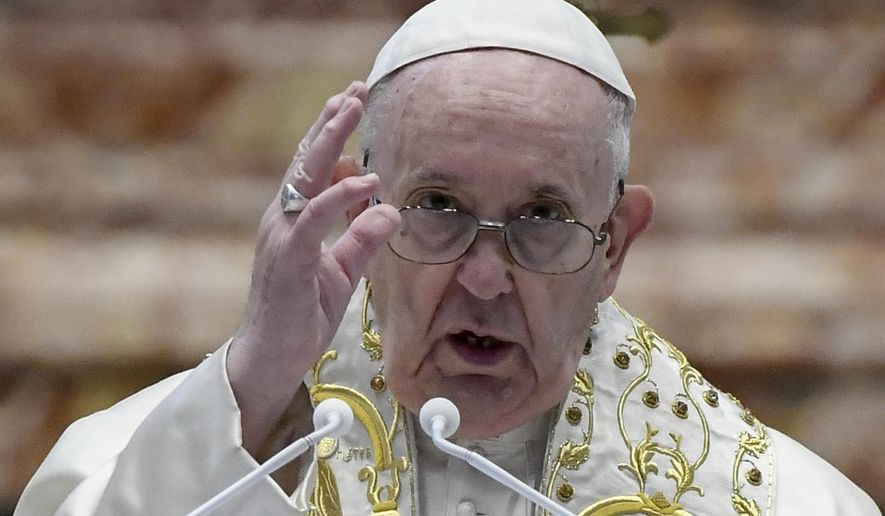Pope Francis on Sunday took aim at global military spending during the COVID-19 pandemic, using his annual Easter message at the Vatican to call on nations around the world to redirect some of their defense budgets toward programs for the poor.
The pontiff delivered his remarks to a small crowd of about 200 inside St. Peter’s Basilica rather than to a massive audience of thousands in St. Peter’s Square, as has been the custom for Francis and his predecessors before the coronavirus outbreak.
But the pope was no less pointed in his remarks, despite the scaled-down nature of the Easter event itself. He ticked off conflicts across the globe, from Burma to Mozambique, and issued a passionate call for peace.
He also condemned the U.S. and other nations that have continued to funnel massive amounts of money into defense budgets and weapons programs despite widespread poverty and an unprecedented international health crisis.
“The pandemic is still spreading, while the social and economic crisis remains severe, especially for the poor. Nonetheless — and this is scandalous — armed conflicts have not ended and military arsenals are being strengthened,” the pontiff said. “That is today’s scandal.”
“There are still too many wars and too much violence in the world. May the Lord, who is our peace, help us to overcome the mindset of war,” Francis said.
Indeed, U.S. military budgets so far have remained roughly the same in the COVID-19 era, with last December’s congressional spending deal authorizing about $696 billion for the Pentagon.
But lawmakers and defense analysts generally expect that the Defense Department budget will likely remain flat for the next several years or possibly even see a slight decrease.
In singling out military spending, Francis offered more proof of his willingness to take stands on specific military matters.
Last summer, for example, he declared nuclear weapons to be “immoral” and urged nations to reduce their stockpiles.
“It has never been clearer that, for peace to flourish, all people need to lay down the weapons of war, and especially the most powerful and destructive of weapons: Nuclear arms that can cripple and destroy whole cities, whole countries,” Francis said during an August 2020 message.
Last month, the pontiff visited Iraq for a historic visit in which he called for peace and an end to nearly two decades of war. His trip coincided with the 18th anniversary of the March 2003 U.S. invasion of Iraq. About 2,500 American troops remain in Iraq today, training Iraqi security forces and conducting missions against the terror group the Islamic State.
Iraq is just one of the global conflicts about which the pope has spoken out. During his Easter message Sunday, he also offered words of encouragement to protesters in Burma who have been demonstrating for months following a military coup in early February.
He also spoke about conflicts in Syria, Yemen, Lebanon, and across Africa. In Syria, Pope Francis said “millions are living in inhumane conditions,” an apparent reference to massive refugee camps such as the infamous al-Hol facility in the northern part of the country.
More broadly, Francis hoped that by next Easter, COVID-19 restrictions on church services and other religious gatherings will have been lifted.
“Dear brothers and sisters, once again this year, in various places, many Christians have celebrated Easter under severe restrictions and, at times, without being able to attend liturgical celebrations,” he said.
“We pray that those restrictions, as well as all restrictions on freedom of worship and religion worldwide, may be lifted and everyone be allowed to pray and praise God freely,” the pope said.
• Ben Wolfgang can be reached at bwolfgang@washingtontimes.com.




Please read our comment policy before commenting.